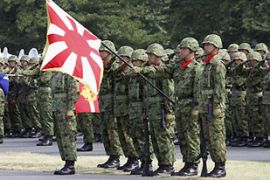Abe sets out new vision for Japan
Prime minister vows to shed legacy of war defeat and take on greater global role.

Published On 26 Jan 2007
US occupation authorities wrote a clause into the constitution after Japan’s surrender in 1945, strictly confining its military to a defensive role with a ban on the use of force.
Abe, known for his nationalistic policies, has been pushing for the elimination of the pacifist clause since he took office in September.
He said Japan needed a stronger deterrent to the threat posed by neighbouring North Korea which launched ballistic missiles and conducted its first nuclear test last year.
Japan’s military should assume a stronger position within the US-Japan security alliance with a bigger role in global peacekeeping missions, the prime minister said.
“Our alliance with the United States is a foundation of peace in Asia and the world. I believe our nation must make contributions that are commensurate with our international status.”
Abe, who faces waning political support, has repeatedly emphasised the importance of remaining a peace-loving country but said that Japan must also look ahead and take pride in its achievements.
Nationalism fears
Critics fear that changes may lead to the nationalism like that of the pre-war years, divert funds to military growth and away from domestic social projects or allow Japan to be dragged into dangerous missions backing the US in the Middle East or elsewhere.
China and South Korea, in particular, have criticised Japan’s government for failing to fully atone for its attempts to colonise their countries and for atrocities its soldiers committed during World War II.
Abe also outlined a revamp of the country’s education system to foster patriotism, eliminate the growing problem of bullying and improve academic performance.
“It is extremely important for our future to properly teach our children these shared values,” he said.
Separately, Japan’s defence minister on Friday backtracked on comments calling the American invasion of Iraq a mistake.
“I did not say it was a mistake, but I thought at the time [the US] should have been more cautious,” Fumio Kyuma said.
He also suggested that English translations of his remarks had led to some of the confusion.
“Instead of being in the past tense, the comment came out very strongly. Perhaps it’s the difference between Japanese and English,” he said.
Abe had said on Thursday that Kyuma had said his comments represented his thinking before the invasion, and did not represent dissent from the cabinet decision to back the war.
Source: News Agencies